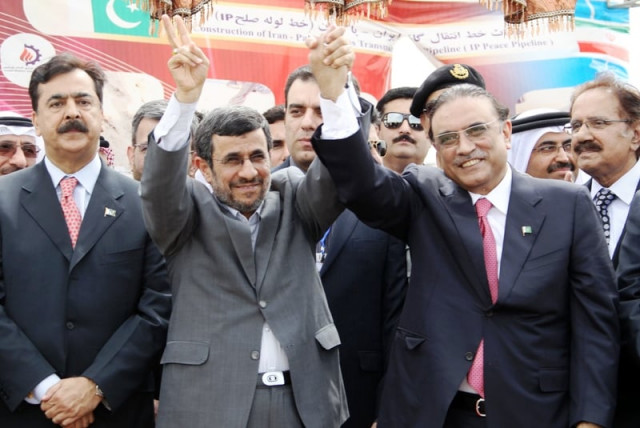High pressure: President inaugurates historic Pak-Iran gas pipeline
Despite US pressure, foundation laying ceremony for the multi-billion dollar pipeline carried out on Pak-Iran border.

Iran's President Mahmoud Ahmadinejad (L) shakes hands with Pakistan's President Asif Ali Zardari during a ceremony marking the start of work on the 780-kilometre (485-mile) pipeline from Iran to Pakistan. PHOTO: AFP
The contentious gas pipeline was inaugurated by Zardari as he pulled the rope to reveal the foundation-laying plaque on the Pak-Iran border for the 1,600 kilometre long pipeline.
A 300-member strong Pakistani delegation led by President Zardari and comprising the country’s foreign minister, petroleum minister and National Assembly speaker and a number of prominent politicians attended the historic ceremony.
Foreign ministry spokesperson Moazzam Ali Khan said several heads of states had also been invited at the inauguration — an event that will see the two neighbouring states sign a crucial yet controversial mega project aimed at easing Pakistan’s energy crisis. However, he refused to give any further details.
One official pointed out that the high-powered inauguration clearly indicated that Pakistan would pursue the project at all costs.
Iran has completed 900 km (560 miles) of pipeline on its side of the border and Iranian contractors will also construct the pipeline in Pakistan, Iran's national broadcasting network IRIB reported.
Tehran has agreed to lend Islamabad $500 million, or a third of the estimated $1.5 billion cost of the 750 km Pakistani section of the pipeline, Fars news agency reported.
The two sides hope the pipeline will be complete in time to start delivery of 21.5 million cubic metres of gas per day to Pakistan by December 2014.
The US has issued warnings to invoke economic sanctions already in place against Iran if Pakistan went ahead with its plans to import natural gas from the Islamic republic.
The United States has steadfastly opposed Pakistani and Indian involvement, saying the project could violate sanctions imposed on Iran over nuclear activities that Washington suspects are aimed at developing a weapons capability. Iran denies this.
India quit the project in 2009, citing costs and security issues, a year after it signed a nuclear deal with Washington.
You can view a slideshow of the inauguration ceremony here.



















COMMENTS
Comments are moderated and generally will be posted if they are on-topic and not abusive.
For more information, please see our Comments FAQ